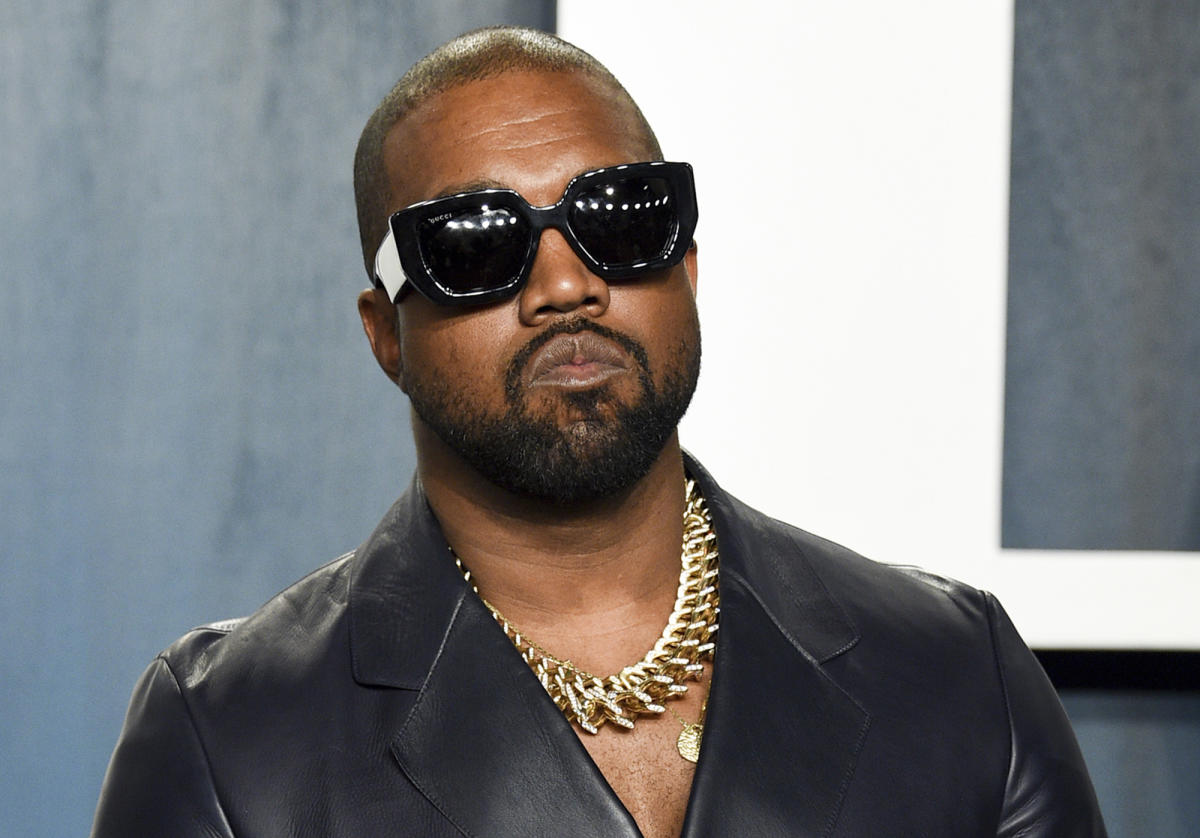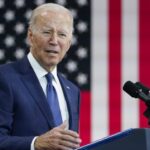For years, Adidas executives kept quiet when celebrity partner Ye, the musician and fashion designer formerly known as Kanye West, made headlines for controversies – they even stayed silent when the artist publicly disparaged the athletic brand’s CEO.
But the German-based company broke its silence last week, days after the artist ignited widespread outrage by wearing a “WHITE LIVES MATTER” T-shirt at his Paris Fashion Week show. Adidas said Thursday that it is reviewing its business deal with Ye and his Yeezy brand, which is estimated to bring in billions in annual revenue.
The pressure on Adidas has only increased in the days since that announcement, as Ye engaged in further bizarre behavior, including posting antisemitic tweets and an online video in which he called himself the “king of culture” while showing a pornographic film to Adidas executives. Now, Adidas executives must decide whether maintaining ties with a partner that has made the company billions is worth the continual public relations nightmares.
Yeezy generates an estimated $2 billion a year, close to 10 percent of the company’s annual revenue, Morningstar analyst David Swartz said.
“The adidas Yeezy partnership is one of the most successful collaborations in our industry’s history,” Adidas said. “We also recognize that all successful partnerships are rooted in mutual respect and shared values.”
Representatives for Ye and Adidas did not respond to The Washington Post’s requests for comment.
Staying silent carries its own dangers, some experts said.
“The problem is, if you go down the rabbit hole, and you accept, and accept, and accept, and you look the other way, then you are, in a sense, co-signing on the behavior implicitly,” said Americus Reed, a marketing professor at the University of Pennsylvania’s Wharton School.
– – –
Ye’s chaotic behaviors are part of his brand, some experts said, and are often excused because fans believe they are what make him a genius.
“If you have a once in a generational force like Kanye West, you’re going to try to do everything you can do to salvage the deal, and to make him happy, and to kind of ignore some of the comments and keep pushing out product, which they’ve done,” said Jared Goldstein, an attorney and co-author of “Sneaker Law,” a legal textbook about the sneaker industry. “But I just think there’s only so much [Adidas] can take. . . . Adidas existed way, way before Kanye West, so I think they’re concerned about their overall image in the public eye.”
Ye, who has won 24 Grammy Awards and released numerous critically acclaimed platinum records, has had a significant impact on the music industry over the past two decades as a rapper and producer. His break in fashion began in 2009, when he partnered with Nike to release the Nike Air Yeezy 1. But Ye became unhappy with his Nike deal.
“He was kind of a free agent in the sneaker world,” Goldstein said.
Adidas partnered with the artist in 2013. The company announced a major expansion in 2015, relocating hundreds of employees from its German headquarters to its U.S. base near Portland.
By 2016, Ye and Adidas agreed to a royalty deal and an increase in inventory to make the product more accessible, Goldstein added. The partnership made Ye a billionaire and opened doors for Adidas to a new customer base.
In the years since the deal, Adidas has improved its distribution, sales and has gained market share in North America, Morningstar’s Swartz said. The company also broke into the resale market, a category dominated by Nike and Michael Jordan’s shoe line, and expanded its athleisure business.
“Their brand equity in consumers’ minds really rose,” Goldstein said. “More deals with celebrities and athletes and designers came to fruition, and Adidas really got hot because of the ‘Kanye effect.’ “
But as he had with his past partnerships, Ye aired his grievances with Adidas in public. In June, he accused the company of stealing his designs, calling out Adidas chief executive Kasper Rorsted by name in a tweet.
The claims almost certainly have no merit, according Goldstein. Although the contract between Adidas and Ye was never made public, the industry standard is that Adidas owns the intellectual property of all designs created during the partnership.
Ye went on similar tirades about Gap, which in 2020 signed a deal to sell clothes the artist designed with French fashion house Balenciaga and open stand-alone “Yeezy” stores. Ye cut off the partnership last month, and his lawyer told the BBC that Ye would open the stores on his own.
Throughout the years of the Adidas partnership, Ye has generated headlines for his comments. In 2018, he said on TMZ that slavery was a choice; in 2020, following a campaign rally in North Charlotte, S.C., for his presidential run, he disparaged abolitionist Harriet Tubman and said he and his then-wife Kim Kardashian considered terminating their first pregnancy. He then went on social media rants exposing his strained relationship with his family.
Kardashian, a reality TV star and business executive in her own right, released a statement asking for “compassion and empathy” because Ye was dealing with mental health issues. In the years that followed, Ye spoke ill of Kardashian, her family and her then-boyfriend, comedian Pete Davidson.
The events over the last few days have further threatened to tarnish Adidas’s reputation and identity as a brand, experts said. On Monday afternoon, Ye posted a 30-minute video on YouTube that includes a scene of him seemingly showing pornography to two Adidas executives. In what appeared to be a secret recording, Ye told them they “have done wrong by the company, by the business and by the partnership.”
On Sunday, Twitter and Meta restricted Ye’s accounts for violating company policies and took down the posts that included antisemitic tropes.
– – –
Ye’s public antisemitic rant presents a particularly sensitive challenge for Adidas, given the company’s own past.
For decades Adidas has distanced itself from certain elements of the past and its founders, brothers Adolf and Rudolf Dassler, who were members of the Nazi Party. Originally called the Dassler Brothers Sports Shoe Factory, the company outfitted members of the Hitler Youth, sneaker expert Jason Coles wrote in his 2016 book, “Golden Kicks: The Shoes that Changed Sport.” The brothers split after the war, with Rudolf turning his half of the business into the company Puma, while Adolf renamed the original Dassler company “Adidas.”
“There’s a dark chapter in the company’s history, which the company clearly does not want people to talk about,” Swartz said. “And this could bring that back.”
If Adidas ends its Ye agreement, the impact on the company’s business won’t be immediate, experts said. The German company will still own the intellectual property of all Yeezy designs made since Ye signed the contract, and there probably is inventory that has been lined up for releases, Swartz said.
“You can’t just end it immediately – there’s going to be some lag,” he said. “It would be expensive to stop selling it.”
If Ye signed an industry-standard agreement, Adidas would also have the right to reproduce already released sneakers and manufacture unreleased designs, Goldstein said. Though Adidas would have to avoid using Ye’s image and likeness and strip the Yeezy branding, it wouldn’t be noticeable since most of the branding is on the sneaker insole, where people can’t see it.
– – –
Ye’s latest tirade erupted with Adidas already facing problems. The company’s U.S.-traded shares have fallen more than 60 percent over the past year, as Adidas has seen business in its most profitable region, China, shrink by double digits for the past five quarters as stores and factories have closed during the pandemic, Swartz said.
Adidas is also facing a leadership change. Rorsted, the chief executive, is leaving next year.
“This Kanye controversy is coming at the worst time,” Swartz said. “It really puts the company in an even more difficult position because they don’t want to make any grand changes in strategy, and then have a new CEO come in and then have to change it again.”
– – –
The Washington Post’s Sonia Rao contributed to this report.
Related Content
West Virginians fear a road meant to help their towns could destroy them
Chicago scientists are testing an unhackable quantum internet in their basement closet
Norway is portrayed as both hero and villain in Europe’s energy crisis




